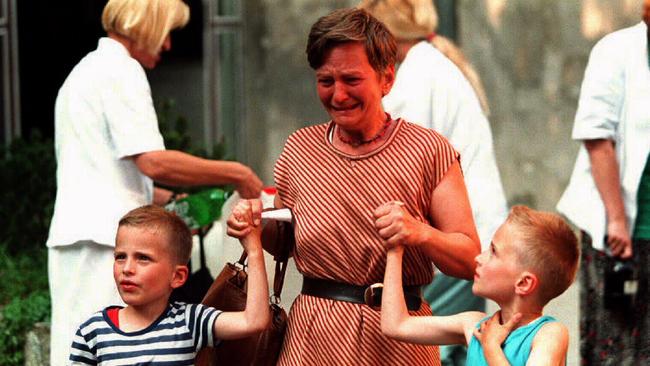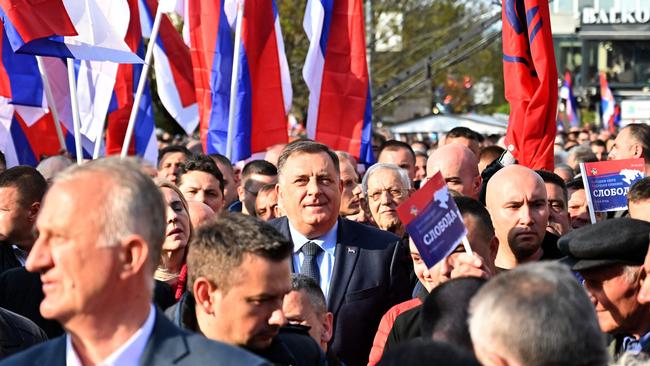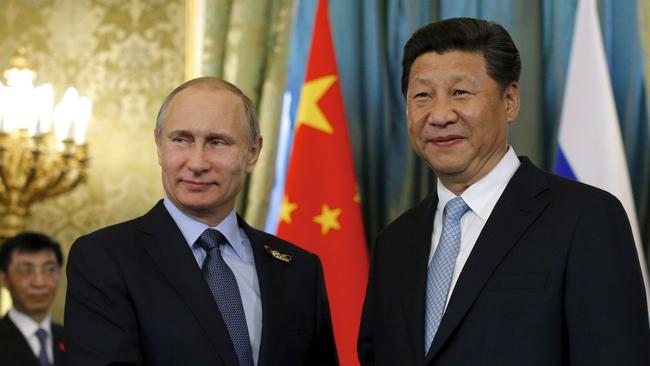Russia, China stir up ‘flashpoint’ as ‘impossible country’ set to explode
President Putin and China’s Xi Jinping look set to stir up this European flashpoint which already has a bloody history.
Leaders
Don't miss out on the headlines from Leaders. Followed categories will be added to My News.
It’s Europe’s heart of darkness. The Balkan nations were the flashpoint for World War I. It was the scene of a brutal, genocidal war in the 1990s. Now Russia’s seeking to exploit the troubled region’s divisive politics to undermine NATO.
The region has been a flashpoint for centuries. It’s a cultural melting pot. It’s been a battlefield between East and West, Christianity and Islam, Nazi Germany and the Soviet Union.
Now President Vladimir Putin’s aiming to stir it up again.
The former republic of Yugoslavia was torn apart along ethnic lines in a brutal civil war between 1992 and 1995. Serbian dictator Slobodan Milosevic’s murderous ethnic cleansing campaign prompted a NATO intervention.
A United Nations-sponsored force has maintained an uneasy peace between the Orthodox Serb, Muslim Bosniak and Catholic Croat communities ever since.
But Moscow – an ally of the Orthodox Serbs – wants this to end. And China – keen to oppose the United States at every opportunity – may also challenge the UN presence.
“Some kind of international force with an adequate mandate is essential to trying to maintain a safe and secure environment in Bosnia Herzegovina,” US Secretary of State Antony Blinken warned this week. “We are engaged with a variety of stakeholders in this on contingency planning.”
That’s because is expected to use Russia’s veto in the UN Security Council to cancel any extension of the UN mandate once it expires in November.
If the peacekeepers leave, the Balkans’ simmering tensions are set to boil over.
In recent months, Bosnia’s Serb officials have repeatedly voiced threats to attempt once again to secede from Bosnia – and claim vast tracts of its territory in the process.
It’s a threat the European Union takes seriously. In recent months, it has strengthened its UN-mandated peacekeeping force with an extra 500 troops.
“Impossible country”
Serbian community leader Milorad Dodik calls Bosnia an “impossible country.”
It’s run by a multiethnic power-sharing government overseen by UN peacekeepers and international envoys.
It’s a structure intended to avoid the brutal massacres of civilians that stained the region’s reputation so profoundly during the 1990s.

But, scratch the surface, and the tensions are still there.
“Those of us living in Bosnia and Herzegovina are all too aware that our frozen conflict is a powder keg waiting to be ignited and that only a potent NATO military presence can ensure long-term peace and stability,” argues political analyst Harun Karcic.
Russia’s Bosnia embassy – playing the Kremlin’s typical propaganda tactic of accusing others of doing what it plans to do – says the West is “destabilising” the region.
It says an example is the recent veto of plans to give the Serb community (but not the Bosniaks or Croats) ownership of state-owned properties within their territory.
Now the region fears that Milosevic’s dream of a “Greater Serbia” – which involved annexing much of Bosnia and expelling non-Serbian populations – is back on the table.

Like Serbia, Bosnia has not condemned Russia’s invasion of Ukraine.
But it is a matter of intense debate within its tripartite government. It’s a debate that has brought Dodik’s ultra-nationalist rhetoric to the fore.
Russia and Serbia back his campaign for the independence of 49 per cent of Bosnia as the “Republik Srpska”.
And since the invasion of Ukraine, Moscow has become more vocal about its Balkan vision.
Moscow’s ambassador in Sarajevo, Igor Kalabukhov, threatened Bosnia with war if it joined NATO: “If Bosnia and Herzegovina decides to be a member of any alliance, that is an internal matter. Our response is a different matter. Ukraine’s example shows what to expect. Should there be any threat, we will respond.”
President Putin is preoccupied with his floundering invasion of Ukraine. But he’s still keen to undermine NATO at every opportunity.
Chairman Xi Jinping, however, may seize the opportunity to gain a diplomatic foothold in the heart of Europe.
The China syndrome
Russia has been pushing hard to reassert Serb control over the Balkans. Now its ally, China, is ready to step up to the plate.
As with the Solomon Islands in the South Pacific, Beijing is seeking a position of power deep in the heart of Europe. And it has “history” in the Balkans.
On May 7, 1999, a NATO air strike seeking to suppress Serbian aggression in Kosovo somehow slammed a missile into the Chinese Embassy in Belgrade. Three Chinese journalists were killed.
But Beijing sees many similarities between the divided Balkan States and its relationship with Taiwan. As such, it backs Serbian claims over other ethnic enclaves – such as Kosovo and Bosnia.

Kosovo – which sits at the junction between Montenegro, Albania, Macedonia and Serbia – has been widely recognised as a sovereign state. This is partly to protect its Albanian population from further Serb ethnic cleaning campaigns.
Kosovo wants to join NATO.
Serbian President Aleksander Vucic insists this is about Washington wanting to embed its control over the region. So he’s turned to President Putin, and Chairman Xi, for support.
“According to Serbian diplomats, China’s behaviour clearly demonstrates its increasing willingness to engage in issues that cannot be resolved by the United States alone, such as the protection of Serbia’s territorial integrity,” argue regional analysts Ana Krstinovska and Agon Demjaha.
Beijing has already successfully lobbied many nations with which it has significant “Belt and Road” economic links to revoke their recognition of Kosovo.
“The question is whether and to what extent China is prepared to (further) aggravate its relationship with Washington to please Serbia and, in return, whether the United States is ready to defend its “investment” in Kosovo’s statehood,” the analysts conclude.
Jamie Seidel is a freelance writer | @JamieSeidel
More Coverage
Originally published as Russia, China stir up ‘flashpoint’ as ‘impossible country’ set to explode





